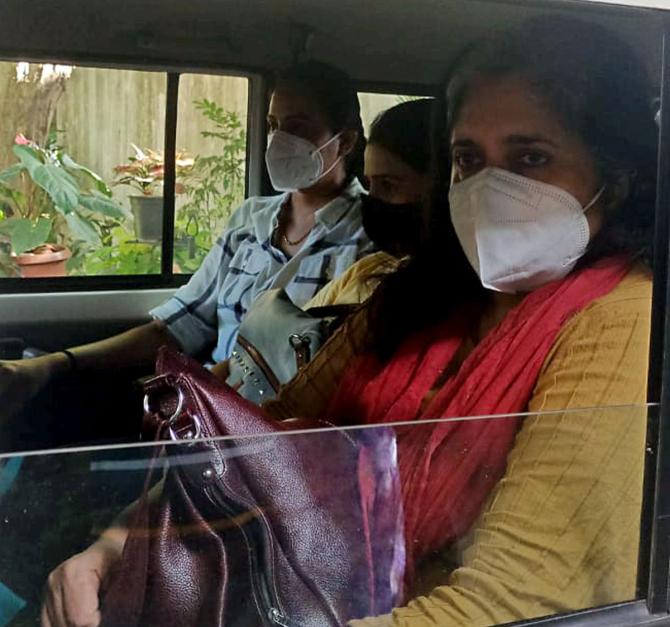The Supreme Court on Friday granted interim bail to activist Teesta Setalvad, arrested on June 25 for allegedly fabricating evidence to frame "innocent people" in the 2002 Gujarat riots cases, saying the high court ought to have considered releasing her on interim bail during the pendency of her case.

A day after taking a serious view of the delayed listing of Setalvad's regular bail plea in the Gujarat high court, a bench headed by Chief Justice Uday Umesh Lalit considered facts such as the woman petitioner having been in jail for over two months and subjected to custodial interrogation for seven days while ordering her release till the Gujarat high court decides the regular bail petition.
The bench, which also comprised justices S Ravindra Bhat and Sudhanshu Dhulia, asked Setalvad to surrender her passport to the trial court.
The top court also asked her to cooperate with the probe agency in the investigation of the case of alleged fabrication of evidence to frame people in riots cases.
”We need not go into the rival contentions advanced by the counsel on behalf of the parties touching upon merits of the matter. For the present purposes, in our considered view, following aspects of the matter which emerge on the record are of some importance.
"A. the appellant, a lady, has been in custody since June 25, 2022. B. The offences alleged against her pertained to the year 2002 and going by the assertions, at best the concerned documents sought to be presented till the year 2012. C. The investigating machinery has had the advantage of custodial interrogation for a period of seven days thereafter the judicial custody was ordered by the concerned court,” it said in the order.
Referring to the sequence of events of the case, the bench said the high court, while issuing the notice to the state government on the regular bail petition, should have considered the plea for grant of interim bail to her.
”Having considered the circumstances on record, in our view the high court ought to have considered the prayer for release on interim bail during the pendency of the matter,” it said.
It referred to the submissions of Solicitor General Tushar Mehta, appearing for the state government, and said the matter was still pending consideration in the high court.
”We are not therefore considering whether the appellant be released on bail or not. That issue certainly be gone into by the high court in the pending application before it.
"Considering the matter only from the stand point whether during the pendency of such an application, the custody of the appellant be insisted upon or whether she can be granted the relief of interim bail,” the court said, adding that Setalvad, according to it, was entitled to the grant of interim bail.
It said Setalvad shall be produced before the court concerned as early as possible and the magistrate will release her on interim bail subject to such conditions as it may deem appropriate to ensure her presence in the pending proceedings.
”The appellant shall surrender her passport which shall be kept in the custody by the concerned court till the matter is considered by the high court...,” it said, adding that she will have to cooperate in the investigation.
Prior to this, the law officer gave some details about the listing of the cases in the high court, saying there was uniformity and what the high court did was being done to all.
He referred to the new system of listing of cases introduced in the high court and said certain matters were auto-listed.
The law officer said Setalvad has been maligning the system since 2002 and the apex court should step in to stop this, when senior advocate Kapil Sibal sought to allege that the high court judge has been giving "short dates" as well.
Sibal, appearing for the activist, said the FIR against her was nothing but repetition of proceedings which had ended in the June 24 judgment of the apex court in the Zakia Jafri matter.
The top court had on Thursday wanted to know the reason for the delayed listing of Setalvad's bail plea by the Gujarat high court, wondering whether "this lady has been made an exception".
It wondered why the high court listed the bail prayer for hearing on September 19, six weeks after it sent a notice to the state government seeking a response to her application.
The Gujarat high court had on August 3 issued a notice to the state government on the bail plea of Setalvad and fixed the matter for hearing on September 19.
Referring to the case against Setalvad, which was registered days after the June 24 verdict of the apex court in the Zakia Jafri case, the bench said, ”Today as the case stands, the FIR is nothing but whatever has happened in the (supreme) court (judgment).”
The bench was apparently referring to the verdict by the apex court bench led by Justice (since retired) AM Khanwilkar who had blamed the petitioners in the Zakia Zafri case for "keeping the pot boiling" and showing the "audacity" to question the integrity of the Special Investigation Team, and observed that "all those involved in such abuse of process need to be in the dock and proceeded with in accordance with law".
Setalvad was arrested on June 25, a day after the verdict was pronounced.
The 2002 Gujarat riots were triggered by the torching of a coach of Sabarmati Express by a mob near Godhra station on February 27 that year.
Fifty-nine passengers, mostly Hindu kar sevaks returning from Ayodhya, were charred to death in the incident.
An Ahmedabad sessions court had on July 30 rejected the bail applications of Setalvad and former Gujarat director general of police R B Sreekumar in the case, saying their release will send a message to wrongdoers that a person can level allegations with impunity and get away with it.
Setalvad and Sreekumar have been accused of fabricating evidence to frame "innocent people" in the post-Godhra riots cases.
They are lodged in the Sabarmati central jail. Sreekumar has also moved the high court for bail.
Former IPS officer Sanjiv Bhatt, the third accused in the case, has not applied for bail. Bhatt was already in jail for another criminal matter when he was arrested in this case.
They were arrested by the Ahmedabad city crime branch in June after a First Information Report (FIR) was registered against them under Indian Penal Code sections 468 (forgery for cheating) and 194 (fabricating false evidence with intent to procure conviction for capital offences).









